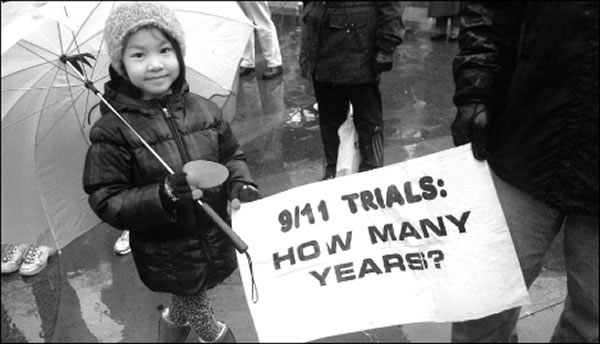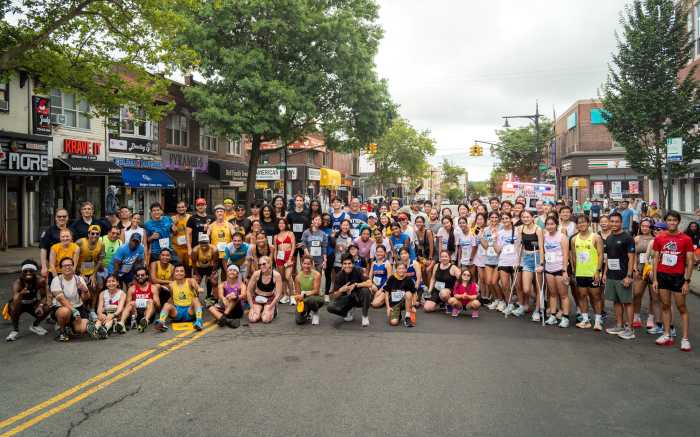By Lesley Sussman
There were plenty of fireworks at the recent Community Board 3 full board meeting, but it had nothing to do with the Chinese New Year.
Tempers flared at the meeting after board chairperson Dominic Pisciotta came under fire from a Chinatown community activist who said that the board and its leadership were engaged in a “conspiracy of silence” when it came to speaking out against the proposed terrorism trials in Lower Manhattan.
About 100 residents attended the Tuesday night Feb. 23 meeting at Public School 20, 166 Essex St.
Addressing the audience, Jan Lee, a Chinatown businessman and a member of the Civic Center Residents Coalition, said, “While bridges have been built between communities to the south and west of Chinatown during the battle to relocate the terror trials out of Lower Manhattan, Community Board 3, which includes the Daniel Patrick Moynihan Federal Courthouse, where the trials would be held, remains deaf, blind and mute during the most important issue facing Lower Manhattan and Chinatown in decades.”
Lee added that, “Silence from Pisciotta and other board leaders can be deadly to Chinatown residents.”
The community activist said, however, that he was pleased to see that the issue was on the evening’s meeting agenda, and acknowledged that Pisciotta was now working closely with Community Board 1 to oppose having the trials at the courthouse.
“It’s a good start,” Lee said. “In the past we haven’t had our backs covered in Chinatown by the leadership of this board, and starting tonight I hope that this will change.”
Immediately leaping to the chairperson’s defense was board member David McWater, who angrily said he felt “ashamed” that anyone would make such charges against Pisciotta and the board. McWater, the board’s former chairperson, accused Lee of having some kind of personal agenda in doing so, which the Chinatown resident strongly denied.
“You’ve been going to Community Board 1 meetings for months and months but you’ve never come here before tonight,” McWater said. “And now you want to go to the media and lambaste Dominick. Let me ask you something. Where are the United States senators on all this? Where are all the other political leaders?
“This is just a volunteer organization,” McWater said of C.B. 3. “There are major, influential players in government who could directly affect this — like the governor — who have failed to take a strong stance. And you pick on Dominic? Why not take on [Governor] Paterson or Senator Schumer?
“It’s ridiculous that you would accuse Dominic and the board of not doing anything,” McWater continued. “It’s one of the most B.S. things you’ve ever done. The fact is that we’re doing a lot. We’ve been helping Chinatown over and over again and we’ve also been working on this thing. It’s just embarrassing to have to listen to you. It’s a horrible thing to say.”
Lee shot back, “If we could look back at a long history of Community Board 3 fighting this thing, I would agree with you. But while the board and its leadership have spoken out vociferously on many issues facing our community, on this issue, which is of great importance nationally and internationally, we unfortunately haven’t heard much from the board. Anyone with their eye on local politics — let alone the C.B. 3 leader — would have known that a large part of the board’s area would be under severe military lockdown.”
Pisciotta also took some criticism for C.B. 3’s response to the terror trials controversy from community board member Harry Wieder, who told the chairperson, “You should have gotten involved earlier. In the future, we need to be more active in engaging people, and we should be talking to [U.S. Attorney General] Eric Holder as well.”
Speaking in his own defense, Pisciotta called the accusations unfair.
“It’s ridiculous to say that I haven’t been concerned about this issue,” he asserted. “Saying that I’ve been silent on this issue is completely false. I’ve been talking about it with community groups — including this board — for months now. But we needed to get all the details before we acted, and that’s what we’ve been doing. We’re on record as strongly opposing holding these trials anywhere in Lower Manhattan, and we’re requesting a meeting with Holder.”
Pisciotta said a board member appeared before the City Council to express C.B. 3’s concerns about the impact of the terror trials on the Chinatown community. In addition, Pisciotta said, he personally met in January with Police Commissioner Ray Kelly, Assemblymember Sheldon Silver and other political and community leaders to be briefed on the security situation.
The chairperson explained that while he initially had supported the trial at its proposed location, 500 Pearl St., he changed his mind after that meeting when he learned all the details involved in the security plan and how it would negatively impact the business and community life of Chinatown.
“I’m now adamantly opposed to it,” he said. “The impact should the trial be held here would be very chilling. The security cost would also be staggering — $200 million a year — and there would be an unbelievable burden on the police force.”
Some board members had earlier sparred with Lee and some of his supporters over whether the federal courthouse where the terror trials are proposed to be held is even with the C.B. 3 district area. The C.B. 3 members said the courthouse was located in an area served by Community Board 1, which in past months has spoken out strongly in opposition to holding the trials in Lower Manhattan.
Pisciotta, however, discounted this argument.
“It makes no difference where the courthouse is located,” he said. “These trials would greatly impact all our communities.”
In fact, the two board districts abut each other, with the courthouse virtually right on the border between them; so if there were to be negative impacts from the trials, both districts likely would feel them.
After the meeting, Lee told The Villager that he recently lost his business on Mott St., and did not want to see any more businesses have to close as a result of all the tight security that would surround the proposed terror trials.
“I speak as someone who has worked with Community Board 3 before on several task forces, and I think that not speaking out forcefully on this issue has diminished this community board,” Lee said. “Community Board 1 has risen to the occasion — they even called an emergency meeting — and has gotten tremendous national and international visibility. But the leadership of Community Board 3 missed the boat.”
Lee added that it was vital for C.B. 3 to become part of the national discussion on this issue.
“It would get the attention from elected officials that it needs and the resources it needs to fight this,” he said. “Thousands and thousands of people will be affected by these trials, and if they don’t speak out they’d be setting a precedent that is very dangerous,” he said of C.B. 3.
Also after the meeting, Pisciotta reiterated that the accusations against him and the board’s leadership were “unfair.”
“It’s on the record that we’ve been engaged in discussions on this since December,” the chairperson said. “I have no idea what Mr. Lee’s agenda is, but there are much better ways to engage the community board by either calling us, sending an e-mail or making a request to address the board. Considering that we all agree on the same thing, it’s just not productive what he’s done tonight.”
Firehouse closings
In other board business, Adam Lynch, a firefighter from Ladder Company 11 on E. Second St., sounded the alarm about the possible closing of 40 or more firehouses throughout the city by Mayor Bloomberg because of the city’s budget crisis.
Lynch, a member of the Uniformed Firefighters Association, urged C.B. 3 to take swift action to help forestall such a move by the Bloomberg administration.
“We firemen have limited influence in preventing firehouse closings,” he said. “We need the community to help us.”
Reacting to the disclosure, one resident said, “When you close firehouses, you’re talking about people burning and dying.” She also urged the board to take immediate steps to block such cuts. Susan Stetzer, C.B. 3 district manager, promised Lynch that the issue would be put on the community board’s April agenda to determine what steps should be taken.
The board concluded the meeting by approving a series of resolutions. Members stated their opposition to changes in critical-care services at the debt-plagued St. Vincent’s Hospital in Greenwich Village, which is struggling to stay afloat.
C.B. 3 also called for continued full funding for the 9/11 health legislation, which provides a variety of federally funded medical and community programs to help residents suffering from chronic and debilitating health problems as a result of the World Trade Center attack. These programs face possible elimination or sharp cutbacks.
Another resolution stated the board’s opposition to any public transportation service cuts in its East Village/Lower East Side district that are now being proposed by the M.T.A. due to budgetary limitations.
The board’s resolutions are advisory only, but carry influence with local politicians and city agencies.






























